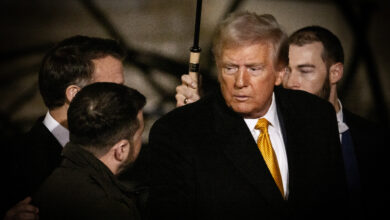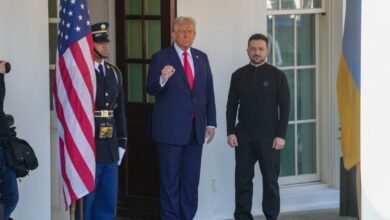
On December 8, 1941, one day after the attack on Pearl Harbor, the United States Congress declared war on Japan, directing President Franklin Roosevelt to bring the war to a successful conclusion. Four years later, President Harry Truman accepted Japan’s unconditional surrender, and the war was over.
From Korea to Vietnam to Iraq and the “forever wars” of today, America’s conflicts after World War II followed a very different, more complicated path. Congress has not declared war since 1942, but presidents have been allowed to bring the nation into “limited wars” with little to no input from lawmakers.
The objectives of these limited wars have been generally murkier, and defining victory has been more elusive. While there’s no doubt the United States won its war against Japan, there’s little consensus on if it is winning in Afghanistan, or even what winning there means.
To Donald Stoker, who was a professor of strategy and policy at the U.S. Naval War College for 18 years, the confusion and public anger that’s come to characterize America’s wars of late is the natural byproduct of a lack of clear objectives from those who wage them in the first place.
In Washington, Stoker says “weird terms and weird buzz words” are pervasive, while basic, core questions like “what do we really want” and “how are we going to preserve the peace once we get it” are overlooked.
Ahead of the release of his new book, “Why America Loses Wars: Limited War and US Strategy from the Korean War to the Present,” The Defense Post spoke to Stoker about what has gone wrong in U.S. foreign policy making and what needs to change to improve outcomes of American engagements in the future.

TDP: In your forthcoming book, you argue that the common rationale driving U.S. policy makers to wage “limited wars” like those in Korea, Vietnam, and Iraq is flawed and leads to failure. Is it your contention that these kinds of limited wars are inherently unwinnable? Or do you believe that they can be won with improved strategies?
DS: I don’t think they’re inherently unwinnable. But the real problem is that they really don’t understand what we’re getting ourselves into sometimes. If you don’t understand your political objective or political aim, if you don’t understand what win means, what victory is supposed to look like, it’s really hard to get there because you don’t even have a vision of it. And that’s sometimes the case.
Execution is always important, but that’s not necessarily the problem. We focus on that for important reasons but we forget that the execution is driven, in theory, by what people want. We’ve gone there to do something, the war has been launched for a reason. But if you don’t even understand what that is, then this creates all these other problems that flow out because you need to match your means and your effort to the objective.
What kinds of political objectives do you think military force can be rationally applied to? And have their been cases where you feel the U.S. has tried to apply military force to a political objective in a way that was irrational and perhaps doomed to fail?
I don’t see that is the issue necessarily. Yes, you could say there are times when military force is not the answer. But again, we don’t start with the use of force. We start with what we want. You have to start with that and then figure out if force is the answer. Many of the people that write about this and talk about it are often thinking backwards. They start with the means.
For example, I went to a lecture at a think tank here [in Washington D.C.] and one of the questions was what to do about Afghanistan. One of the experts there immediately talked about all these tactical things that should be done. Okay, so what? If you do these things it still doesn’t solve the larger problem you’re not telling me how to deliver the objective and you’re not even telling me what the objective is you’re trying to deliver. You’re talking about the means in a vacuum. That’s what the bigger bigger problem is.
For example, during a big chunk of the Korean War, the Truman administration was not even clear about what it wanted to achieve. So at that point, you’re killing people and breaking things for no reason or for reasons you don’t understand yourselves.
Sometimes political objectives change in the course of a war, which you argue isn’t necessarily good or bad. But do you feel that sometimes, the change in objective is a result of unintended consequences that should have been anticipated, like the influx of jihadist insurgents into Iraq after the 2003 invasion for example?
That’s a fallout from failure to secure the country and failure to have enough means to accomplish the objective. But the objective did change there, which I think is part of the confusion. That affected everything else because that means how you planned originally to get that objective probably no longer applies.
Initially, the objective in Iraq wasn’t even a limited one, it was unlimited: regime change. But when you change the objective, you end up with a defensive objective, a limited political aim of preserving the new government that we established. That requires a lot more means than actually overthrowing the country. That’s harder. And when you change what you want, that changes everything else.
It was the same with the Korean War. Initially, there’s a defensive, limited political objective to preserve South Korea. Then the Truman administration decided that they would conquer North Korea. And so that’s a completely different war. Before they even achieved their first aim, they decided to invade North Korea and try to overthrow the regime, which is an unlimited political aim. As long as none of the third-party actors interfere, you can probably do that. But that assumes a lot. That assumes it’s going to go well. That assumes everything’s going to be perfect.
George Kennan [the U.S. diplomat and historian] pointed it out to them at the time. He said: “we went to South Korea to protect it from Communist aggression. When we invade North Korea, what makes you think the Chinese and the Soviets are going to sit there and let us do that? We wouldn’t.” And he ended up being right.
As you note in the book, historians revealed that a significant motivation behind Lyndon Johnson’s decision to dramatically increase U.S. involvement in Vietnam was that he feared not doing so would hurt him politically and hinder his domestic goals. Do you feel that hidden domestic objectives are an overlooked factor in foreign policy decisions and that considering them may help us understand why the stated objectives have been so murky?
That’s a hard one to answer. Historians have looked really deeply into Johnson’s motivations, and exactly like you say, what Johnson did was partly out of fear that not doing so could damage his domestic agenda. Sometimes, yes, you do have these hidden concerns. People might very publicly state why they’re doing something. But is that really the answer? Sometimes you just don’t know. It’s difficult to figure that out at the time and sometimes you have to wait until later.
Sometimes the reasons are complicated. The political objective for going to war in Korea was to preserve South Korea. That was the really clear stated objective. But it was also driven by larger concerns that they didn’t really publically state at the time. You know, “if we don’t fight here is just going to tell the Soviets that they can move elsewhere? What are our allies in Europe going to say if we don’t support the South Koreans? What would the Japanese say if we don’t support the South Koreans?”
They’re thinking these things and writing about them, but they’re not saying them very publicly at the time. But it’s certainly underneath what is going on and motivating what they do.

You point out that before the U.S. became involved in the Second World War, Congress provided President Roosevelt with an official declaration of war that included instructions to bring the war to a successful conclusion. But Congress has not officially declared war since, and the 2001 Authorization of Use of Military Force has no such provision. Do you feel that going forward, Congress needs to play a more active role in matters of war?
Yes I think that’s very important. Maybe if you had more pressure or involvement from Congress and more insistence upon bringing these things to an end, I mean Congress is supposed to exercise oversight. Even in the 1950s, some of the critics were saying: “if we don’t act here, what is the precedent this is going to set? Are we abrogating our authority?” And you can make an argument that they were correct, that Congress needs to take on more of its Constitutional role here.
You note that going to war without a declaration was seen as an anomaly in 1950, but has since become the norm. How did that come to be? And why do you think leaders in Congress have allowed that to happen?
I haven’t yet decided that completely for myself. Part of it is the presidency has just become stronger and stronger. But It’s definitely a failing in Congress to exercise its authority. Certainly there’s some political reasons for not doing this because if you declare war, you’re responsible for it. That’s asking a lot and sometimes there’s an unwillingness to take that on and challenge the president.
It seems that presidents and the Congress as well have been happy with these authorizations for military force. But there have been critics. Back to Korea, the critics there made the argument that was done was technically illegal. I’m not a legal historian, But that’s an argument that’s been going on since then.
 If future policy-makers read your book, what is the ultimate lesson that you hope they learn from it?
If future policy-makers read your book, what is the ultimate lesson that you hope they learn from it?
I hope that they will learn to think more clearly and to have, in their own minds, what they really want to get out of a war. When they take the nation to war, they should understand that it really should end at some point. And to understand that they have to get clear in their minds what is victory and what is the political aim. What really are we trying to accomplish here? Do we really want this? Is it worth the cost that we’re going to pay for it?
These are basic questions that I think sometimes just aren’t really being considered. The whole point of the book and the main argument is to learn to think about war in a different way and think more clearly about it. We throw out these weird terms and weird buzz words that are fashionable for two or three years and go away. But we need to get back to the really core, basic questions. Do we really want this this badly? How are other nations going to look at this? What does victory look like? How are we going to preserve the peace once we get there?
The last chapter of the book is about securing the peace and in some ways is the most important chapter in the book. Certaintely now it’s the most timely. This is something that is just not dealt with enough and discussed enough. I’m hoping that it will have some effect on the way these things are talked about and the way they’re taught as well.
Why America Loses Wars: Limited War and US Strategy from the Korean War to the Present by Donald Stoker
Cambridge University Press, August 2019
336 pp., £22











